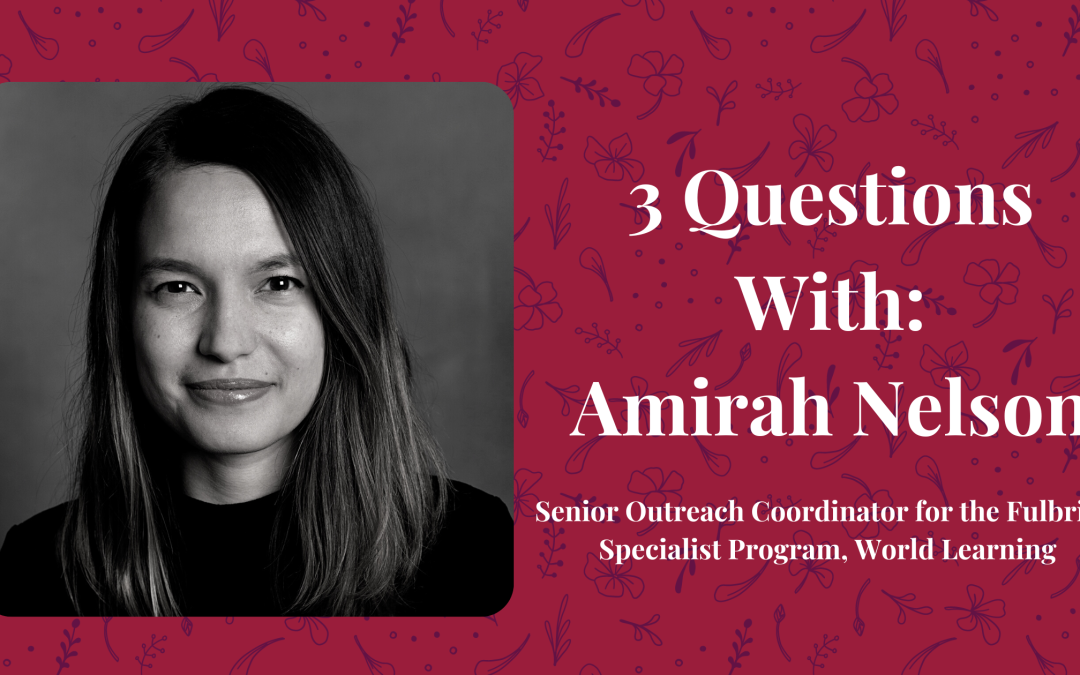Our Q&A about the Fulbright Specialist Program with Amirah Nelson the Senior Outreach Officer for the Fulbright Specialist Program at World Learning. She provides important insights about all that this unique experience has to offer.
Tell us a bit more about the Fulbright Specialist Program and how it is different from other
Fulbright awards? For example, why is it only 2-6 weeks in length?
The Fulbright Specialist Program provides a unique opportunity for U.S. academics and
professionals who are well-established in their careers to serve as an expert consultant and
engage in education, training, or capacity building activities at an overseas host institution in any
one of 160 eligible countries and other areas (https://fulbrightspecialist.worldlearning.org/participating-countries).
Through the program, institutions abroad such as institutions of higher education, government
ministries, NGOs, medical institutions and cultural organizations have the opportunity to
connect with U.S. experts for a short project that furthers their institution’s own needs and
goals. It’s also a great opportunity to lay a foundation for further institutional cooperation.
One of the key aspects of this program, which you have highlighted, is its short-term nature:
Fulbright Specialist awards can be anywhere from a minimum of two to six weeks in length. This
enables institutions that may not be able to host Fulbrighters for a longer period of time the
ability to engage with the Fulbright Program, and means it is also a great option for individuals
here in the U.S. who aren’t currently able to spend 3-10 months away to participate in some of
the other Fulbright Program opportunities that are available.
The other key aspect of this program is its host-driven nature. The projects that Fulbright
Specialists conduct are conceptualized and proposed by overseas host institutions based on the
needs that they have. Accordingly, Specialists are usually engaged in education or training
activities, such as delivering workshops, contributing to curriculum development, conducting
needs assessments, or supporting strategic planning. Fulbright Specialist awards actually do not
enable one to conduct their own research abroad.
The host-driven nature of the Fulbright Specialist Program also impacts its application structure,
which differs from many other Fulbright awards. Rather than proposing your own project when
you apply, aspiring Specialists will need to apply for admission to the Fulbright Specialist Roster
(https://fulbrightspecialist.worldlearning.org/specialist-application-process). Individuals
recommended for admission the Roster receive a three-year tenure, during which time they can
apply for projects that become available or be requested specifically by an institution.
Can you give us an example of what past participants in business education have done with this
opportunity?
Sure! One great recent example is Dr. Iryna Pentina (https://www.utoledo.edu/business/faculty/mib/IrynaPentina.html), who just completed a project at La Rochelle University in France. Her focus while there was helping the institution to
expand its curriculum in the area of digital marketing. This included conducting numerous
meetings with faculty to introduce them to the teaching content and methods for Digital
Marketing Certificate courses offered by her home institution, University of Toledo, and offering
guidance on potential course topics and content, teaching methods, etc. and exploring
opportunities to conduct projects or potentially a virtual course jointly with both institutions.
WiBE member Dr. Vanessa Patrick (https://www.bauer.uh.edu/vpatrick/) will actually be
heading to Indonesia later this year as a Fulbright Specialist! She will be hosted by Institut
Teknologi Bandung, and will be teaching a few short courses for undergraduate and MBA
students, as well as working together with faculty to develop a Global Business Strategy faculty
development module and upskilling faculty in the area of cross-cultural management.
How have you seen participating in the Fulbright Specialist Program impact alumni and their
careers?
The Fulbright Specialist Program is a great way to grow and strengthen your relationships and
collaboration with like-minded colleagues abroad – we continually observe that the majority of
Fulbright Specialist alumni remain in contact with colleagues in their host country. In fact, a
recent survey of more than 1,000 alumni going back to 2001 revealed that more than 80% of
alumni are still in touch with their colleagues!
These relationships and collaboration can often help lay the groundwork for alumni further their
own careers through the impact on their research, teaching, and scholarship. Going back to that
survey, nearly 50% of alumni reported that they had been back to their host country for
additional professional engagements, 47% had published or were engaged in developing
research findings for publication in collaboration with their host, and 31% had used their
Fulbright Specialist experience or continued engagement with their host to seek a grant or other
funding for further collaboration. Anecdotally, a number of alumni also report that receiving a
Fulbright award helps raise the profile of their work both here and abroad.
Beyond that, serving as a Specialist is not meant to be a one-way street. A Fulbright Specialist
award can provide you with new insights and perspectives from another country that can
reinvigorate your teaching and enable you to infuse curriculum with cross-cultural perspectives.
INFORMATION ON APPLICATION
How can WiBE members apply/get involved in this program?
You can apply to the Fulbright Specialist Roster via our
(https://fulbrightspecialist.worldlearning.org/). While you can create and submit an application at
any time, applications are evaluated approximately every two months
(https://fulbrightspecialist.worldlearning.org/specialist-application-process).
Where can interested participants learn more?
The best place to start learning more is the program’s website
(https://fulbrightspecialist.worldlearning.org/), where you can find more information about the
program, review evaluation criteria and FAQs, or register for a general information session or
one-on-one consultation.

